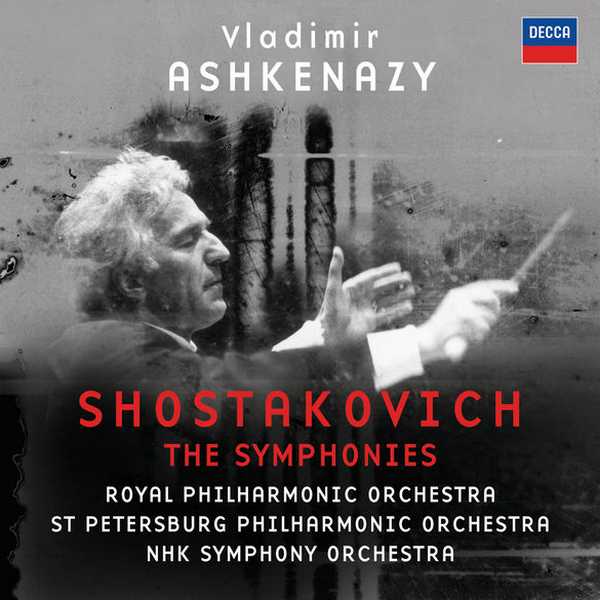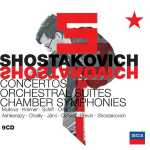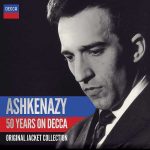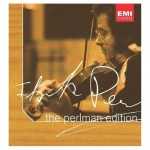
Composer: Dmitri Shostakovich
Performer: Joan Rodgers, Mikhail Kotliarov, Sergei Koptchak, Nikita Storojev, Brighton Festival Chorus, The Bach Choir, Nikikai Chorus Group
Orchestra: Royal Philharmonic Orchestra, St Petersburg Philharmonic Orchestra, NHK Symphony Orchestra
Conductor: Vladimir Ashkenazy
Number of Discs: 12
Format: FLAC (tracks)
Label: Decca
Catalogue: 4758748
Release: 2007
Size: 2.85 GB
Recovery: +3%
Scan: cover
CD 01
Symphony No. 1, Op. 10
01. 1. Allegretto – Allegro non troppo
02. 2. Allegro
03. 3. Lento
04. 4. Lento – Allegro molto
Symphony No. 6 in B minor, Op. 54
05. 1. Largo
06. 2. Allegro
07. 3. Presto
CD 02
01. Festive Overture, Op. 96
02. October – Symphonic Poem, Op. 131
03. Symphony No. 2 in B major, Op. 14 – “To October”
Song of the Forests – Oratorio, Op. 81
04. 1. When the War was over
05. 2. The Call rings through the Land
06. 3. Memory of the Past
07. 4. The Pioneers plant the Forest
08. 5. The young Communists forge onwards
09. 6. Walk into the Future
10. 7. Glory
CD 03
Symphony No. 12 in D Minor, Op. 112 “The Year 1917”
01. 1. Revolutionary Petrograd (Moderato – Allegro – Più mosso – Allegro)
02. 2. Razliv (Allegro. L’istesso tempo – Adagio)
03. 3. Aurora (L’istesso tempo – Allegro)
04. 4. Dawn of Humanity (L’istesso tempo – Allegretto – Allegro – Moderato)
Symphony No. 3, Op. 20 – “1st of May”
05. 1. Allegretto – Allegro
06. 2. Andante
07. 3. Allegro – Largo
08. 4. Moderato: V pervoye Pervoye maya
CD 04
Symphony No. 4 in C minor, Op. 43
01. 1. Allegro poco moderato
02. 2. Presto
03. 3. Moderato con moto
04. 4. Largo
05. 5. Allegro
CD 05
Symphony No. 5 in D minor, Op. 47
01. 1. Moderato
02. 2. Allegretto
03. 3. Largo
04. 4. Allegro non troppo
Five Fragments, Op. 42
05. 1. Moderato
06. 2. Andante
07. 3. Largo
08. 4. Moderato
09. 5. Allegretto
CD 06
01. Shostakovich Broadcasts From Besieged Leningrad In 1941
Symphony No. 7, Op. 60 – “Leningrad”
02. 1. Allegretto
03. 2. Moderato (poco allegretto)
04. 3. Adagio
05. 4. Allegro non troppo
CD 07
01. Funeral & Triumphal Prelude, Op. 130 (In memory of the heroes of the Battle of Stalingrad)
Symphony No. 8 in C minor, Op. 65
02. 1. Adagio
03. 2. Allegretto
04. 3. Allegro non troppo
05. 4. Largo
06. 5. Allegretto
07. Novorossisk Chimes (The Fires of Eternal Glory), Op. 111b
CD 08
Chamber Symphony, Op. 110a
01. 1. Largo
02. 2. Allegro molto
03. 3. Allegretto
04. 4. Largo
05. 5. Largo
Symphony No. 10 in E minor, Op. 93
06. 1. Moderato
07. 2. Allegro
08. 3. Allegretto
09. 4. Andante – Allegro
CD 09
Symphony No. 11 in G minor, Op. 103 “The Year of 1905”
01. 1. The Palace Square (Adagio)
02. 2. Ninth of January (Allegro – Adagio)
03. 3. Eternal Memory (Adagio)
04. 4. Alarm (Allegro non troppo – Adagio – Allegro)
CD 10
Symphony No. 13, Op. 113″Babi Yar”
01. 1. Adagio – “Babi Yar”
02. 2. Allegretto – “Humour”
03. 3. Adagio – “In the Store”
04. 4. Largo – “Fears”
05. 5. Allegretto – “A Career”
CD 11
Symphony No. 14, Op. 135
01. 1. De Profundis
02. 2. Malagueña
03. 3. Loreleya
04. 4. Samoubiytsa
05. 5. Na cheku
06. 6. Madam, posmotrite!
07. 7. V turme Santé
08. 8. Otvet zaporozhskikh kazakov konstantinopolskomu sultanu
09. 9. O Delvig, Delvig!
10. 10. Smert poeta
11. 11. Zaklyucheniye
CD 12
Symphony No. 9 in E flat, Op. 70
01. 1. Allegro
02. 2. Moderato
03. 3. Presto –
04. 4. Largo –
05. 5. Allegretto
Symphony No. 15, Op. 141
06. 1. Allegretto
07. 2. Adagio – Largo – Adagio – Largo
08. 3. Allegretto
09. 4. Adagio – Allegretto – Adagio – Allegretto
Twenty years in the making, this 2007 cycle of the complete symphonies of Shostakovich marks a milestone in the career of Vladimir Ashkenazy. The Russian émigré pianist turned conductor began the cycle with the Royal Philharmonic in 1987 with the Fifth and followed that with the First and Sixth in 1988, the Second and Ninth in 1989, the Tenth and Fifthteenth in 1990, the Eighth in 1991, and the Third and Twelfth in 1992. He shifted to the St. Petersburg Philharmonic for the Eleventh in 1994 and the Seventh in 1995, and then to the NHK Symphony for the Thirteenth in 2000, and, finally, the Fourth and Fourteenth in 2006. Whatever the orchestra and whenever the date, Ashkenazy’s fundamental approach to the composer remained unchanged: this is Shostakovich played big, bright, brawny, and above all heroic. There’s passion in his First and pathos in his Eighth, rhetoric in his Second and Third and realism in his Eleventh and Twelfth, but above all there’s courage in his Fifth, bravery in his Seventh, triumph in his Tenth, strength in his Thirteenth, and against-all-odds victory in his Fifthteenth. The Fourth and Fourteenth, the last recorded symphonies, are leaner in texture, darker in tone, and sterner in manner then the rest but no less persuasive. Each orchestra’s playing is highly individualistic — the English Royal Philharmonic is warmly colored, the Russian St. Petersburg Philharmonic is strongly rhythmic, and the Japanese NHK Symphony is brilliantly virtuosic — but each plays with consummate musicality and obvious affection for Ashkenazy. Considering the variety of venues, Decca’s lush digital sound is remarkably consistent. Compared with Barshai’s ardent authenticity, Mravinsky’s grim austerity, Kondrashin’s urgent advocacy, and Rozhdestvensky’s violent irony, Ashkenazy’s direct approach may seem too straightforward for some listeners, but his honesty, sincerity, and efficacy cannot be denied.
By the way, the NHK Fourth is a new recording. Ashkenazy first recorded the work in 1989 with the Royal Philharmonic. And for the record, the earlier performance is bigger, brighter, brawnier, and more unambiguously heroic than the later performance.



